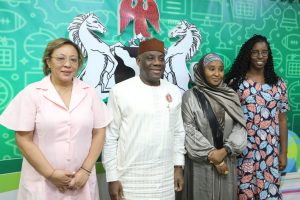
The Minister of Education, Dr. Maruf Olatunji Alausa, has expressed Nigeria’s readiness to bolster its diplomatic relations with the nation of Cuba in key areas of educational development.
The minister made the remark when he hosted a courtesy visit from the Ambassador of Cuba to Nigeria, Miriam Morales Palmero, in his office in Abuja.
In his remarks, Alausa expressed Nigeria’s commitment to enhance the quality of education, increase school enrollment, and expand technical and vocational education.
He emphasised six high priority areas: data collection, addressing out-of-school children, teacher professional development, skills acquisition, STEM (Science, Technology, Engineering, Mathematics), and medical sciences.
He noted that Cuba’s expertise in technical and vocational education aligns well with Nigeria’s focus.
Alausa also emphasised the importance of girl-child education, digitalisation, and quality assurance.
He acknowledged the historical ties between Nigeria and Cuba, dating back to the first legal framework signed on March 24, 1981, which facilitated collaborations in various sectors, including education.
Alausa also announced plans to renew the memorandum of understanding by January 2025, with the legal team expediting the review process.
He accepted Cuba’s invitation to the International Conference on Pedagogy 2025, scheduled for February, and expressed interest in Cuba’s “Yes, I Can” literacy programme, which integrates skills training and aligns with Nigeria’s goals for adult literacy and technical education.
The minister highlighted Nigeria’s openness to business, with significant investments in infrastructure and human capital development under the Tinubu’s Administration, noting a growth rate of 3.6% in the last quarter.
In her address, the Minister of State for Education, Dr. Suwaiba Sa’id Ahmad, observed the shared focus between Nigeria and Cuba on technical and vocational education and training (TVET) and skill development.
She noted similarities in strategies concerning the education of young girls, including foundational literacy and essential skills acquisition.
Dr. Ahmad expressed interest in further discussions to exchange experiences and enhance the impact of these programmes.
Speaking earlier, the Ambassador of Cuba to Nigeria, Miriam Morales Palmero, congratulated the ministers on their appointment and expressed Cuba’s readiness to enhance cooperation in education.
She mentioned a new agreement under review, indicating both nations’ commitment to strengthening educational ties.
The ambassador extended an official invitation to the International Conference on Pedagogy 2025 in Cuba, emphasising the significance of Nigeria’s participation among over 200 countries.
She introduced Cuba’s “Yes, I Can” literacy programme, designed for adult education, highlighting its cost-effectiveness and adaptability to various communities.
The ambassador discussed Cuba’s approach to vocational training, offering programmes that provide technical specialisation without necessitating a university degree, aiming to influence technological and productive transformations in the economy.
She underscored Cuba’s achievements in education, citing a literacy rate of 99% since the revolution, and advocated for the exchange of experiences between Cuba and Nigeria for mutual benefit.
The Assistant Director, Bilateral, in the ministry, Mrs. Mary Oludoun, provided an update on the status of the agreement between Nigeria and Cuba, noting that the final document was sent to the Federal Ministry of Justice in March and is awaiting return.
She emphasised the importance of following up with the Ministry of Justice to expedite the process.
The Director of Press and Public Relations in the ministry, Folasade Boriowo, said in a press release that the meeting underscored the longstanding bilateral relations between the two nations and set the stage for renewed partnerships in the education sector.
“This meeting marks a pivotal step towards deepening educational collaboration between Nigeria and Cuba, with both nations poised to benefit from shared experiences and joint initiatives in the education sector,” Boriowo said.
